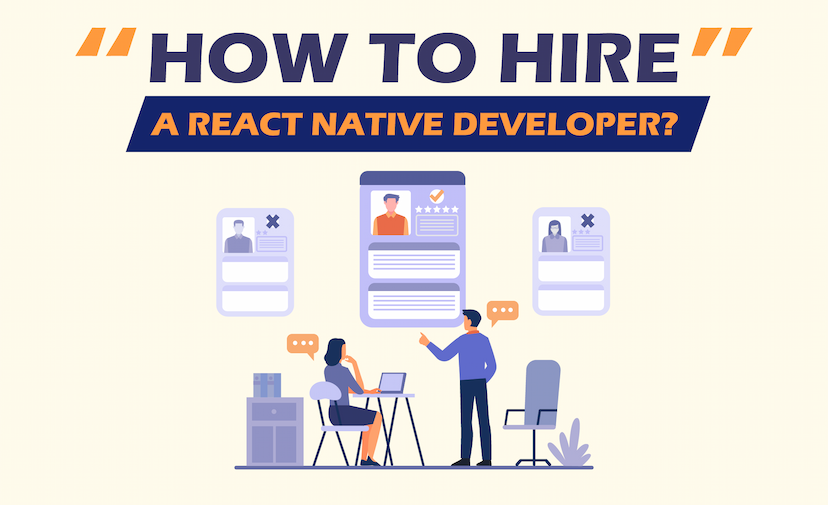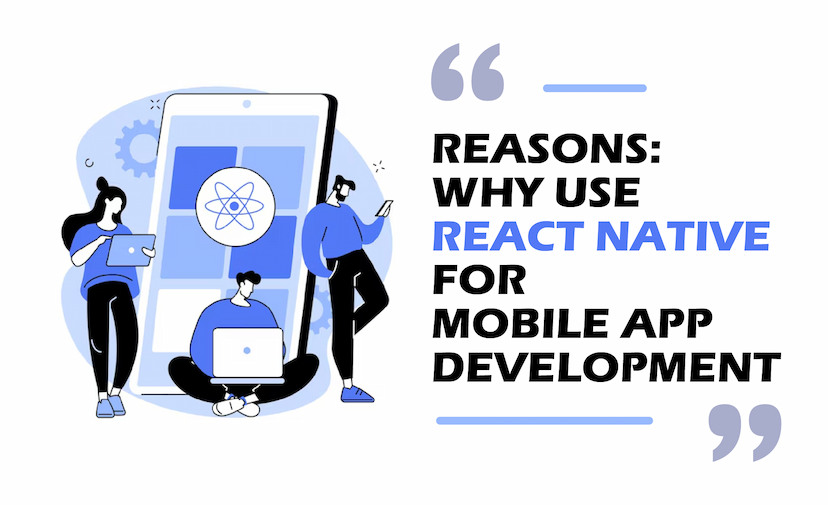
Why React Native for Mobile App Development
React Native has gained high popularity, and there are various reasons for it. This indicates that React Native developers are in high demand. The architecture of React Native makes it more impactful and favorable, which allows developers to develop applications for various platforms using the same code, and the development will be faster.

Some other essential features of this framework include :
- It is community-driven.
- Development of Android and iOS apps with a single code base
- A quick refresh of the code with hot reloading
- Maximum code reuse and cost savings
- Strong performance for a mobile environment.
- Modular and intuitive architecture.
- Publish updates for the app faster.
Get in Touch Now!
Have a word with our expert consultants about your next project to get suggestive guidance & proposal.
React Native Technology - A Quick Overview
Take a quick look at this framework and grasp the roles and responsibilities of React Native developers before delving into the process of hiring them. React Native is a prominent open-source JavaScript framework. Developed on Facebook's React technology, it excels as a top-notch application development platform. In 2015, Facebook made React Native to avoid having different Android and iOS codes. While React is used for web app development, React Native possesses the same architecture and functionality. This framework has been the driving force behind many magnificent apps.
This framework develops mobile apps for both Android and iOS using JSX, JavaScript, and XML-like markup together. For iOS app development, the apps use C, and for Android, they use native rendering APIs in Java. Despite the appearance of new mobile apps and cross-platform frameworks, React Native is constantly becoming popular. According to research, it has the second position among the frameworks increasingly used by developers worldwide.
Understand the Roles and Responsibilities of a React Native Developer
A React Native developer must be well-versed and an expert in native platforms and JavaScript. They should have enough work efficiency on the app's front end, requiring knowledge of cross-platform compatibility, API services, and integration infrastructure.
Let's understand the roles and responsibilities of a React Native developer when developing mobile apps.
- Develop complicated and feature-rich apps.
- Boost the efficiency of a program close to native.
- Find and fix bugs.
- Modify React web apps into React mobile apps.
- Improve elements for excellent performance.
- Develop excellent programming from wireframes and prototypes.
- Cooperate with native modules when required.
- Enhance the app presentation by removing blocks.
- To boost mobile app performance, work with Redux architecture.
- Develop apps within a predetermined time and budget with the coordination of cross-functional teams.
- Deploy the automation checks to facilitate software testing effectively.
Checklist While Choosing React Native Developers
To hire an efficient React Native developer, study these critical points. Review them thoroughly, and when evaluating a development team, ensure they hold these features before deciding.
Non-Technical Skills of a React Native Developer
Besides technical proficiency, evaluating a developer's soft skills is essential. It allows bits of intelligence into their work ethic and productivity. Soft skills reveal a candidate's persona, often surpassing technical skills in importance. The developers must have leadership, helpfulness, problem-solving skills, and a willingness to learn.
Here, we'll highlight some essential non-technical skills for a React Native developer.
- Good Communication
- Problem-Solving Skills
- Great Adaptability
- Good Time Management
- Team Work
Technical Skills of a React Native Developer
For React Native developers to develop persistent and scalable apps, they need precise technical skills. We rank candidates at three levels: junior, middle, and senior.
For Junior React Native Developers:
React Native Knowledge:
Strong understanding of the fundamentals of React Native, comprising its main components, libraries, and APIs
JavaScript Coding:
Mastery of JavaScript traits and improvements, especially JS6 or newer
Navigation Skills:
Basic skills in - in-app navigation, like push and modal functionalities
Redux Understanding:
Consciousness of Redux, a state management tool used to manage states shared across components in active app environments effectively
For Mid-Level React Native Developers:
Performance enhancement:
Understanding of standard approaches to optimizing app performance.
Third-Party Integration:
Ability to incorporate third-party services like Paypal, Facebook, Google, etc., and work with their APIs to broaden app functionality.
Mobile-Specific Features:
Capability to include mobile-specific hardware traits such as microphones, GPS sensors, cameras, and gyroscopes; expertise in defeating related challenges
Sign and deploy apps:
Knowledge of the signup flow and application deployment process. Awareness of receiving components for app signing and deployment of apps on the App Store and Google Play
For Senior React Native Developers:
Develop native apps:
Capability to effectively port existing iOS and Android apps, with basic familiarity in native app development languages such as Java, Kotlin, Objective-C, and Swift.
Libraries Integration:
Skill in incorporating libraries and frameworks into applications and developing cross-platform mobile apps that feel native.
Continuous Integration and Delivery:
Ability to accomplish constant integration and delivery, guaranteeing the development of bug-free code and real-time features.
Research and Discussions:
Taking charge of app architecture, features, and functionality. Active involvement in discussions, research, and idea sharing.
Effective Team Workflow:
Ensure smooth communication between all development team members who put years of experience into assisting and mentoring junior developers.
How to Hire a React Native Developer?
Each method has a few common steps to follow. The onboarding process must also be stress-free and successful, which requires cautious preparation. Here, we are exploring an efficient approach to hire the right candidate for your next project.
There are three approaches to hiring React Native developers:
- Employ an in-house developer.
- Hire a freelancer.
- Engage a React Native app development company.
To hire a React Native developer, follow these steps:
Understand the Requirements:
Specify project requirements and consider the crucial features, functionality of the app, types of users, third-party integrations, and platform preferences (Android and iOS).
Prepare the Job Overview:
Prepare a precise job summary, including the company's background, the project idea, technical terms, expectations, and a skills checklist. This informs the hiring team about potential candidates.
Consider various hiring options:
Select within in-house hiring for full ownership, select freelancers for smaller projects with skilled monitoring, or select on-site outsourcing for outsourcing talent from front-end firms.
Make a List of Shortlisted Candidates:
Once the job overview is published, shortlist applicants based on their portfolios, experience, work from previous roles, and recommendations. Choose the most suitable applications for further interviews.
Interview the Selected Candidates:
Evaluate the React Native developers with the relevant questions of React Native and React JS differences, core components, state usage, memory leak resolution, and experience related to the project. Also, consider collaboration, communication, and problem-solving skills. Evaluate as per the specific projects during the interview.
Conclusion
With these guidelines for hiring a React Native developer, you can undoubtedly appoint a dedicated developer for the upcoming project. We also believe that all the defined steps and points are simple and direct you to hire a React Native developer for the next project.
At SicilianTech, our experts specialize in supporting companies in hiring remote, dedicated software developers or efficient software development teams.










